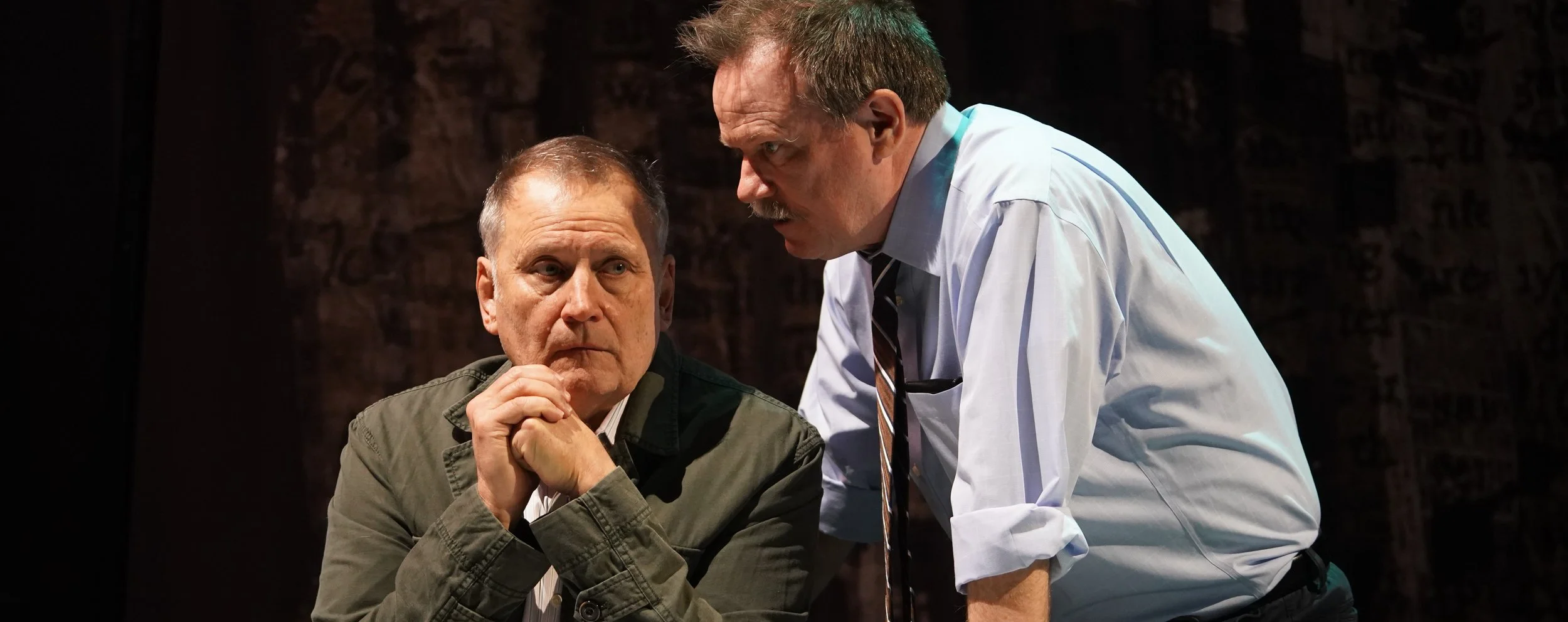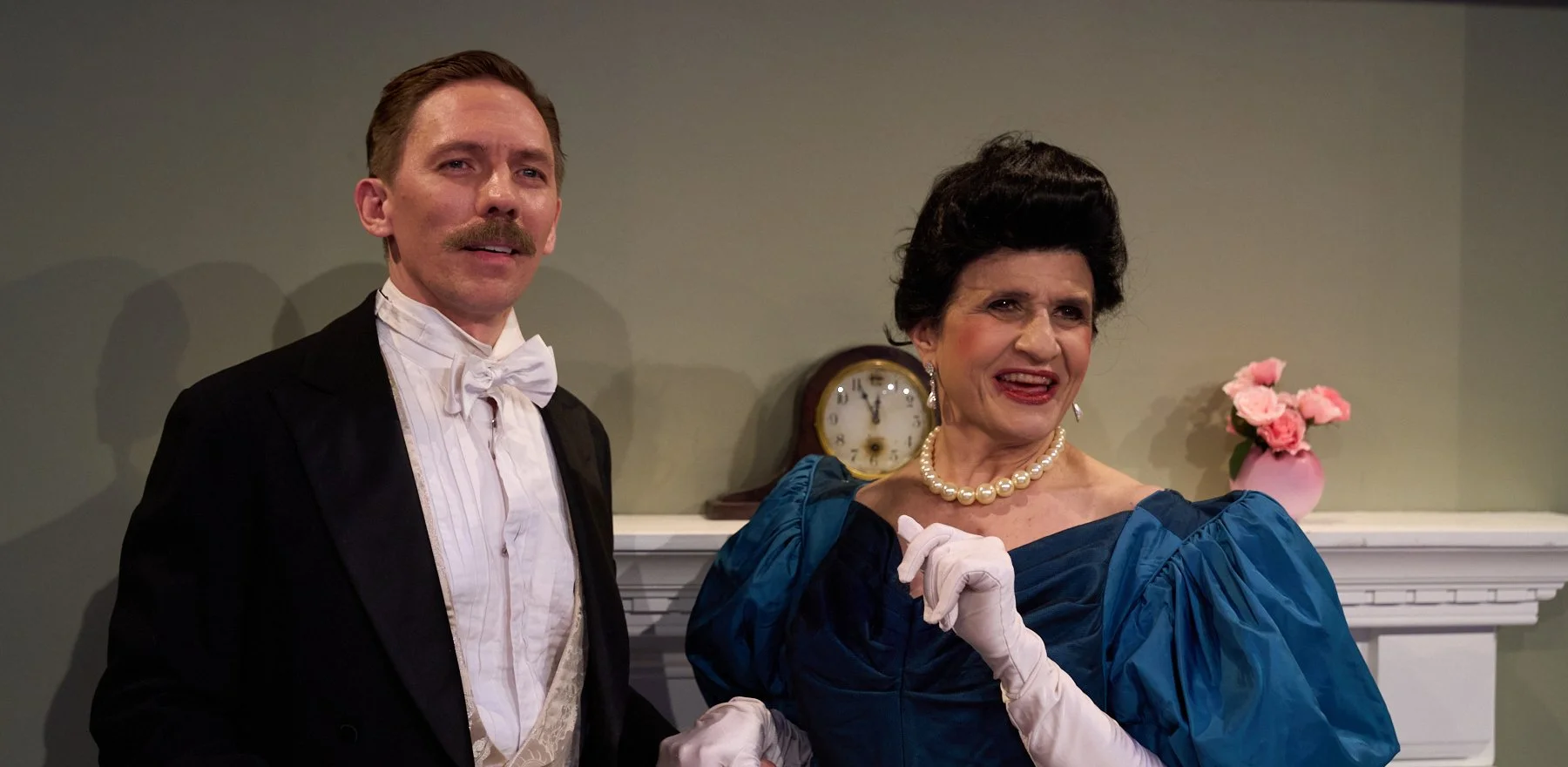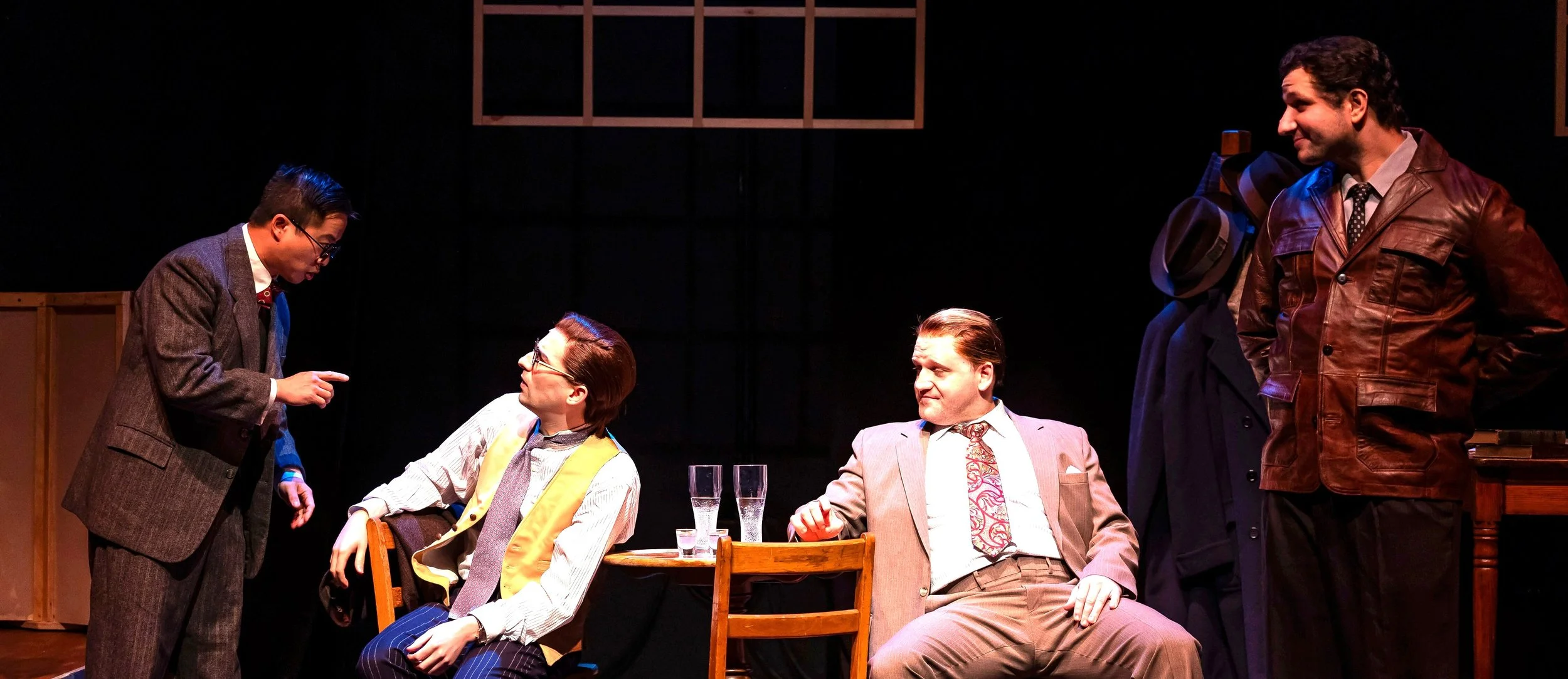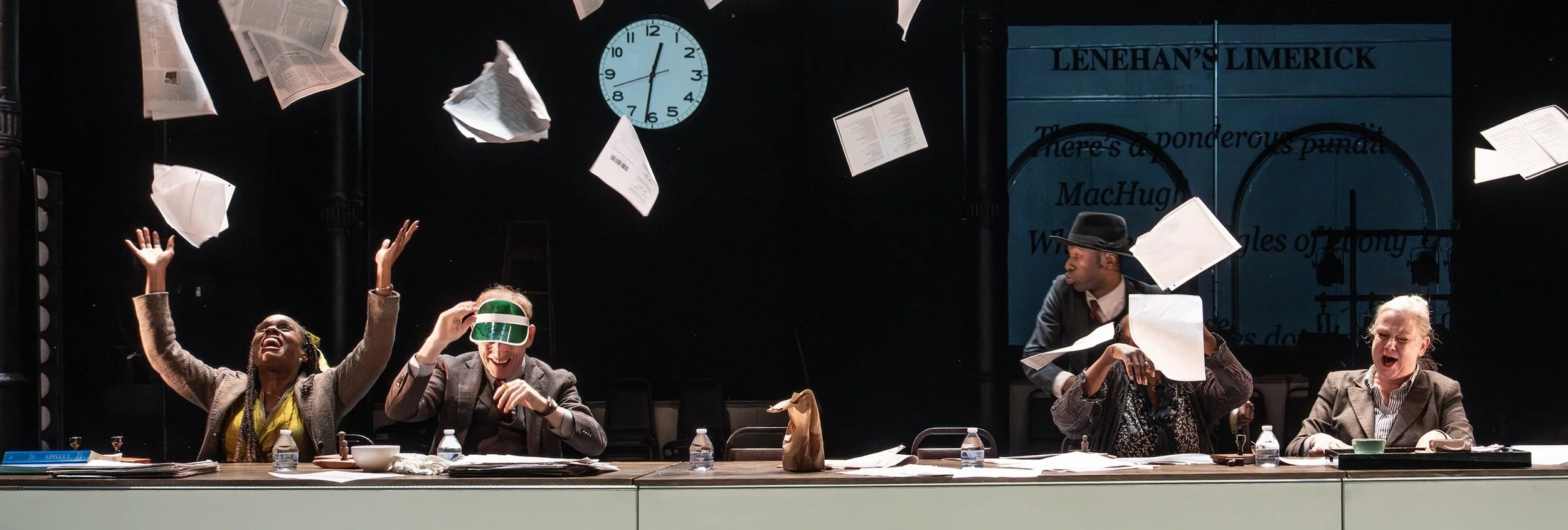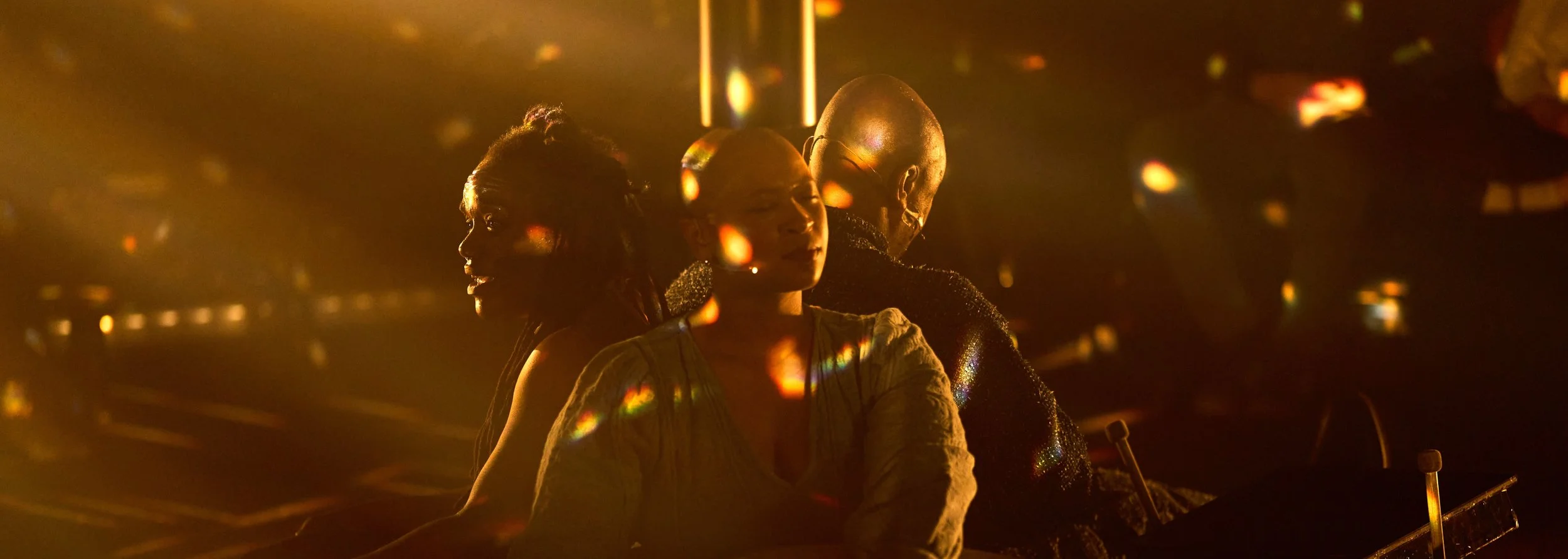Not Nobody, written by Brian Dykstra, is a play about ethics and the legal system. Under the direction of Margaret Perry, the work centers on McAlester Daly (Dykstra himself), a former ethics professor. One evening, he is out walking when a couple of cops—Officer Ricketts (Sheffield Chastain, who deftly plays a wide range of characters) and Officer Chavana (Kathiamarice Lopez, who brings a crispness to every role she plays)—stop him. He’s in a neighborhood where a middle-aged white guy typically wouldn’t be, and the cops find that odd.
An Ideal Husband
“Behind every great fortune lies a great crime” is a quotation attributed to French novelist Honoré de Balzac, but it applies directly to the plot of Oscar Wilde’s An Ideal Husband (1895). Written close to Wilde’s peak—it opened just a month before The Importance of Being Earnest—Husband fizzes with epigrams and uses heightened language to expose hypocrisy. The Storm Theatre is brave to tackle the work, packed both with melodrama and wit, but to succeed, as Sir Peter Hall did with his Broadway production 30 years ago, requires skills and experience that it can’t altogether muster.
I Wish My Life Were Like a Musical
In I Wish My Life Were Like a Musical, written by Alexander S. Bermange and directed by Eamon Foley, four talented performers share their love of musicals—even though their show has just closed unexpectedly. The plucky quartet spends the ensuing 75 minutes delightfully recounting their personal reasons for loving theater while spoofing some of the most popular musicals of all time. Their commitment to the genre is infectious. And even though their love is temporarily unrequited, they wave the banner of devotion like Jean Valjean from Les Misérables, one of the many shows parodied.
Ai Yah Goy Vey!
In his solo show Ai Yah Goy Vey!, Richard Chang celebrates multicultural New York through the fictional tale of a Chinese man’s borough-hopping search for the father he has never met. But his picaresque is peppered with questionable jokes and portrayals, and, despite an impressive array of costumes, props and video backdrops, the production has an amateurish air to it.
Blackout Songs
Joe White’s Blackout Songs, nominated for an Olivier Award in 2023 and now playing Off-Broadway, depicts the convulsive romance of Alice and Charlie, who meet at the coffee urn of an Alcoholics Anonymous (AA) meeting and rush headlong into the squalid territory of pop-modernist classics such as The Lost Weekend and Days of Wine and Roses. Drunken-wastrel love is an old story, but White—with skilled assistance from director Rory McGregor and a team of very good theatrical designers—gives this short, insightful drama a 21st-century sheen.
Hans Litten: The Jew Who Cross-Examined Hitler
“My goal is to write plays with exciting stories, smart characters and sharp dialogue. The reviewers report that my plays are full of philosophical ideas. So be it. I’m tired of plays about dysfunctional families and jumbled identities. For me, ideas are more exciting.” So goes the program bio of Douglas Lackey, author of Hans Litten: The Jew Who Cross-Examined Hitler, a new historical drama at Theater Row. And he’s true to his words, or at least two of them: “philosophical ideas” dominate, sometimes at the expense of character development, tension, and atmosphere. What’s onstage isn’t uninvolving or unmoving, but one is very aware of what’s missing.
Anonymous
Playwright Nick Thomas’s powerful Anonymous centers on a weekly meeting of an addiction support group. Skillfully crafted to highlight the strength of community and recovery, Anonymous focuses on diverse characters who speak about their lives while seeking support from their fellow addicts. All the participants have secrets, protecting themselves until powerful disclosures transform an ordinary weekly meeting into something extraordinary.
Data
With Data, playwright Matthew Libby has crafted both a techno-thriller and an indictment of Big Tech, in all its mercenariness and disregard for personal privacy and security. Whereas tech-themed dramas typically portray futuristic scenarios, Data’s story of a Silicon Valley company aiding in a federal immigration crackdown seems ripped from this week’s headlines.
Ulysses
Gatz, the signature creation of downtown theater troupe Elevator Repair Service (ERS), included every sentence of F. Scott Fitzgerald’s 1924 novel The Great Gatsby, with each performance running a whopping eight hours (including intermissions and dinner break). At the Public Theater these days (16 years after Gatz premiered there), ERS is offering its take on Ulysses, the ravishingly innovative novel—serialized in 1918, published in book form in 1922—that secured James Joyce’s position as preeminent pioneer of stream-of-consciousness narrative in English. As with Gatz, the script of Ulysses consists entirely of the novelist’s original prose; this time, though, there are numerous elisions, permitting each performance to clock in at a mere two hours and 40 minutes.
Going Bacharach
For nearly 70 years, the songs of Burt Bacharach, one of the most renowned and versatile figures in contemporary music, crossed genres, continents, and cultures. He collaborated with and accompanied the music industry’s finest singers, lyricists, and fellow musicians. Going Bacharach, directed by David Zippel, is a revue of Bacharach’s musical genesis and his many cross-genre innovations.
Edward
In Edward, written, performed, and directed by Ed Schmidt, a small box of 27 mundane artifacts becomes a form of domestic archaeology, each item revealing a fragment of a life once lived. Gathered around a table in independent bookstores across New York City, audiences help reconstruct—night by night—a portrait of the late Edward O’Connell, a former high school English teacher whose faith in literature echoes through the stories and the spaces where they are told.
The Bookstore
Michael Walek’s The Bookstore is a cozy, unprepossessing play about the power of literature to change one’s life and the importance of both writing and reading. It is also about the people who do one or the other, and those who try to do both, and it’s peppered with nuggets about writers, readers, and the spectrum of human experience.
Dream Feed
Dream Feed, currently at HERE, is a poetic meditation on the theme of dreams. Performed by the two-time Grammy Award–winning theatrical family band the HawtPlates (Jade Hicks, Justin Hicks, and Kenita Miller-Hicks), the production utilizes sound and song to bring subconscious ideas to the surface.
The Disappear
The Disappear feels like an incomplete puzzle: Its pieces don’t fit together. This new play, written and directed by Erica Schmidt, is overloaded with undercooked melodramatics and ideas.
Juxtapose | A Theatrical Shadow Box
A work that has been collaboratively devised by members of the Happenstance Theater troupe, Juxtapose | A Theatrical Shadow Box cites as its influences the artworks of Joseph Cornell and the French films Amélie (2001) and Mon Oncle (1958). The play, directed by Mark Jaster and Sabrina Selma Mandell, explores randomness and dissimilarity and focuses on the lives of tenants in a French apartment house through a series of scenes that can be identified from their artistic influences or simply enjoyed as charming vignettes arranged in visually striking tableaux. Either way, the result is a multilayered and curious work that is both thought-provoking and delightful.
Bob Marley: How Reggae Changed the World
Bob Marley: How Reggae Changed the World is a soulful solo journey that traces reggae’s roots and its global reverberations through the life and legacy of its most iconic figure. Written, performed, and directed by Duane Forrest, the show blends acoustic music, personal storytelling, and audience connection, allowing one to glimpse how Bob Marley’s message reshaped not only a genre, but lives.
Night Stories
The Holocaust is never light fare for anyone, and it may be presumptuous to say, but its darkness is no more acutely felt than by those who survived it. The Congress for Jewish Culture’s production of Night Stories: Four Tales of Reanimation dramatizes the Yiddish poems of Avrom Sutzkever, widely acknowledged as the most eloquent Holocaust poet. Sutzkever’s poems, which depict the ghetto in Vilnius, Lithuania, under Nazi occupation, reflect the emotional roller coaster of its residents’ existence, pivoting among horror, humor, and an ambivalent desire for both death and redemption.
Predictor
Playwright Jennifer Blackmer takes great pains to jazz up a history lesson in Predictor, her tribute to the unheralded woman who created the home pregnancy test, Meg Crane. The chronological account of Crane’s invention is interspersed with musical and joky skits, as well as scenes representing Crane’s thoughts or flashbacks in her life.
Tartuffe
Molière’s Tartuffe is robustly reimagined by Lucas Hnath in a randy new version directed by Sarah Benson, turning the classic comedy of hypocrisy into a breathless, contemporary satire. With choreography by Raja Feather Kelly and a fearless cast led by Matthew Broderick and David Cross, the production unleashes ferocious wit and gleeful buffoonery.
Anna Christie
Anna Christie,Eugene O’Neill’s 1922 Pulitzer Prize drama, has been overshadowed by his late, great behemoths: Long Day’s Journey into Night and The Iceman Cometh are more often seen than the briefer play. Yet Thomas Kail’s enthralling production at St. Ann’s Warehouse makes a strong case for this neglected earlier work.

